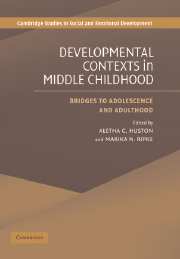Book contents
- Frontmatter
- Contents
- Contributors
- Foreword
- Acknowledgments
- 1 Middle Childhood: Contexts of Development
- 2 The Significance of Middle Childhood Peer Competence for Work and Relationships in Early Adulthood
- 3 Aggression and Insecurity in Late Adolescent Romantic Relationships: Antecedents and Developmental Pathways
- 4 Middle Childhood Family-Contextual and Personal Factors as Predictors of Adult Outcomes
- 5 Genetic and Environmental Influences on Continuity and Change in Reading Achievement in the Colorado Adoption Project
- 6 Reciprocal Effects of Mothers' Depression and Children's Problem Behaviors from Middle Childhood to Early Adolescence
- 7 Middle Childhood Life Course Trajectories: Links Between Family Dysfunction and Children's Behavioral Development
- 8 The Contribution of Middle Childhood Contexts to Adolescent Achievement and Behavior
- 9 Educational Tracking Within and Between Schools: From First Grade Through Middle School and Beyond
- 10 School Environments and the Diverging Pathways of Students Living in Poverty
- 11 The Relations of Classroom Contexts in the Early Elementary Years to Children's Classroom and Social Behavior
- 12 Out-of-School Time Use During Middle Childhood in a Low-Income Sample: Do Combinations of Activities Affect Achievement and Behavior?
- 13 Low-Income Children's Activity Participation as a Predictor of Psychosocial and Academic Outcomes in Middle Childhood and Adolescence
- 14 Healthy Mind, Healthy Habits: The Influence of Activity Involvement in Middle Childhood
- 15 Media Effects in Middle Childhood
- 16 Continuity and Discontinuity in Middle Childhood: Implications for Adult Outcomes in the UK 1970 Birth Cohort
- 17 Mandatory Welfare-to-Work Programs and Preschool-Age Children: Do Impacts Persist into Middle Childhood?
- 18 Effects of Welfare and Employment Policies on Middle-Childhood School Performance: Do They Vary by Race/Ethnicity and, If So, Why?
- 19 Effects of a Family Poverty Intervention Program Last from Middle Childhood to Adolescence
- 20 Experiences in Middle Childhood and Children's Development: A Summary and Integration of Research
- Author Index
- Subject Index
- References
14 - Healthy Mind, Healthy Habits: The Influence of Activity Involvement in Middle Childhood
Published online by Cambridge University Press: 16 September 2009
- Frontmatter
- Contents
- Contributors
- Foreword
- Acknowledgments
- 1 Middle Childhood: Contexts of Development
- 2 The Significance of Middle Childhood Peer Competence for Work and Relationships in Early Adulthood
- 3 Aggression and Insecurity in Late Adolescent Romantic Relationships: Antecedents and Developmental Pathways
- 4 Middle Childhood Family-Contextual and Personal Factors as Predictors of Adult Outcomes
- 5 Genetic and Environmental Influences on Continuity and Change in Reading Achievement in the Colorado Adoption Project
- 6 Reciprocal Effects of Mothers' Depression and Children's Problem Behaviors from Middle Childhood to Early Adolescence
- 7 Middle Childhood Life Course Trajectories: Links Between Family Dysfunction and Children's Behavioral Development
- 8 The Contribution of Middle Childhood Contexts to Adolescent Achievement and Behavior
- 9 Educational Tracking Within and Between Schools: From First Grade Through Middle School and Beyond
- 10 School Environments and the Diverging Pathways of Students Living in Poverty
- 11 The Relations of Classroom Contexts in the Early Elementary Years to Children's Classroom and Social Behavior
- 12 Out-of-School Time Use During Middle Childhood in a Low-Income Sample: Do Combinations of Activities Affect Achievement and Behavior?
- 13 Low-Income Children's Activity Participation as a Predictor of Psychosocial and Academic Outcomes in Middle Childhood and Adolescence
- 14 Healthy Mind, Healthy Habits: The Influence of Activity Involvement in Middle Childhood
- 15 Media Effects in Middle Childhood
- 16 Continuity and Discontinuity in Middle Childhood: Implications for Adult Outcomes in the UK 1970 Birth Cohort
- 17 Mandatory Welfare-to-Work Programs and Preschool-Age Children: Do Impacts Persist into Middle Childhood?
- 18 Effects of Welfare and Employment Policies on Middle-Childhood School Performance: Do They Vary by Race/Ethnicity and, If So, Why?
- 19 Effects of a Family Poverty Intervention Program Last from Middle Childhood to Adolescence
- 20 Experiences in Middle Childhood and Children's Development: A Summary and Integration of Research
- Author Index
- Subject Index
- References
Summary
There is growing evidence that participating in extracurricular and out-of-school activities during adolescence is associated with both short- and long-term indicators of positive development (e.g., Eccles & Barber, 1999; Eccles & Templeton, 2002; Mahoney, 2000). Yet, few researchers have questioned whether these relations are solely the result of activity participation during adolescence or if they are the culmination of a process that began in middle childhood. Middle childhood is marked by many physical, cognitive, social, and contextual changes. It is during this time that children develop multiple cognitive skills, such as reasoning and the ability to reflect on one's accomplishments, experiences, and aspirations. Children's social worlds broaden as they begin to participate in organized out-of-school activities. The changes in children's abilities and skills coupled with the new contexts in which children develop suggest that middle childhood is an important period for the development of skills and beliefs through participation in out-of-school activities. Although entry into adolescence and adulthood brings new abilities and interests, some of the benefits of adolescent participation may not be realized unless the groundwork is laid in middle childhood.
There is little evidence available concerning developmental hypotheses about the reasons or mechanisms for these associations. Longitudinal studies over extended periods of time afford an opportunity to examine positive and negative consequences of participation based on activity characteristics as well as other potential influences such as parental encouragement or child talent.
- Type
- Chapter
- Information
- Developmental Contexts in Middle ChildhoodBridges to Adolescence and Adulthood, pp. 283 - 302Publisher: Cambridge University PressPrint publication year: 2006
References
- 23
- Cited by



